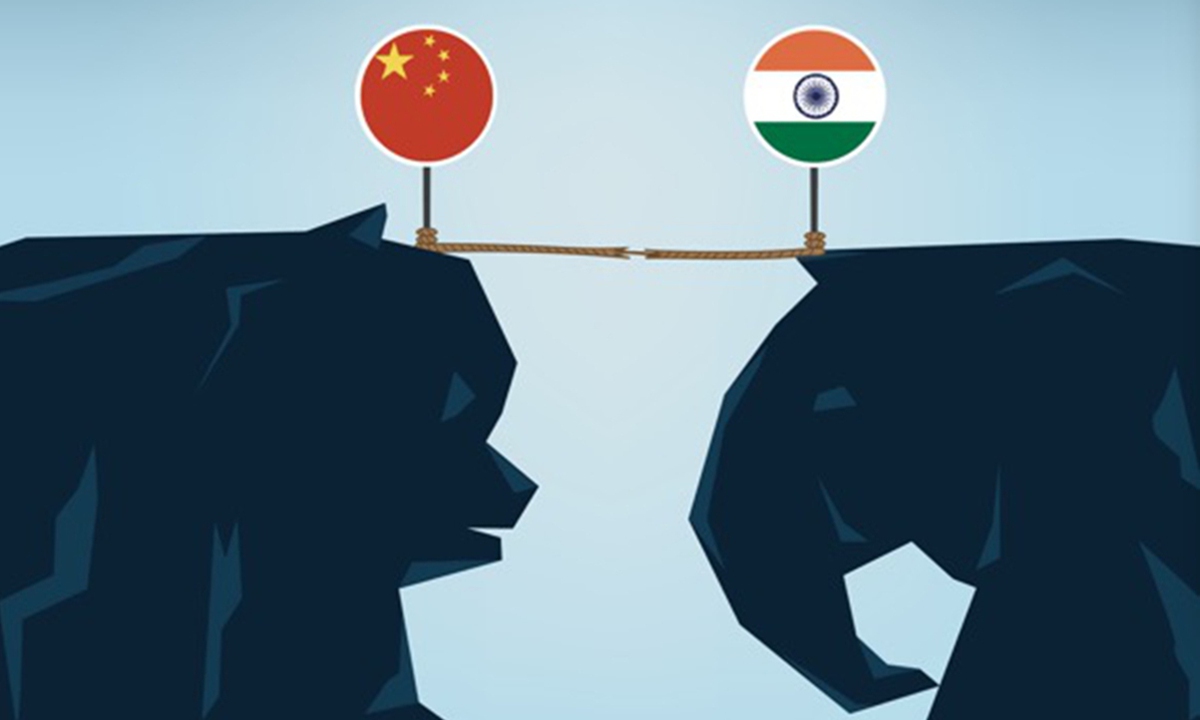Do India-China relations need a reset?
By Qian Feng Source: Global Times Published: 2020/7/29 23:08:56

Illustration: GT
Recently, some Indian political analysts and media outlets have claimed it is inevitable and necessary to "reset" China-India ties. This is because they believe it is China's moves that have changed the status quo, which China and India should respect under a range of bilateral agreements since 1993.
India's view that China changed the status quo goes against the facts. India suffered casualties in a bloody clash in the Galwan Valley on June 15. But it was Indian border troops that first illegally crossed the Line of Actual Control (LAC). Indian border troops should assume full responsibility for the clash. The cause of China-India border conflicts this year also stemmed from India, whose border troops have been building roads and bridges at the LAC in the Galwan Valley since April. It is Indian side that has been trying to change the status quo.
China-India border tensions have de-escalated in recent days. So why are some Indian people still calling for a reset of India-China relations?
Neither Indian officials nor Indian media outlets have clearly presented the true story of the Galwan Valley clash. Most Indians lack a proper understanding of the conflicts, and their anti-China sentiments are running high.
After India suffered severe casualties in the June 15 incident, Indian politicians, the public and scholars believed India suffered a great loss, and they could not bear it. When India had conflicts with other South Asian countries, such as Pakistan, India would take retaliatory military measures against them. But when the opponent is China, India acts differently. India is aware of its military gap with China as well as the grave consequences of launching a massive military clash with China. Hence, India cannot resort to military means to deal with the Galwan Valley clash. This further breeds Indians' anti-China sentiment.
India is on the rise, and Indian nationalism is ramping up. Additionally, Indian media outlets add fuel to the fire. That's what has prompted some Indians to propose a reset of China-India relations.
This round of China-India border tensions has, to a large extent, affected India's China strategy. It broke the positive momentum of bilateral relations.
Furthermore, US Secretary of State Mike Pompeo recently delivered a speech in which he called on the "free world" to change China. New Delhi is a significant anchor in Washington's Indo-Pacific Strategy. China-India border tensions provide the US an opportunity to further woo India to help it contain China. The US sowing discord between China and India will impair the settlement of border disputes and the development of China-India relations.
Whether Donald Trump is reelected or not, the US and India will strengthen their cooperation to contain China. India also feels more confident by strengthening military cooperation with the US and its allies. This imposes a relatively large threat to China's security, and also makes it more difficult for China to deal with similar issues in the future.
As the two largest emerging powers, Beijing and New Delhi should avoid border conflicts from affecting overall China-India relations, and make efforts to continue to maintain peaceful surroundings to secure their economic development.
The author is director of the research department of the National Strategy Institute at Tsinghua University in Beijing. opinion@globaltimes.com.cn
RELATED ARTICLES:
Posted in: VIEWPOINT